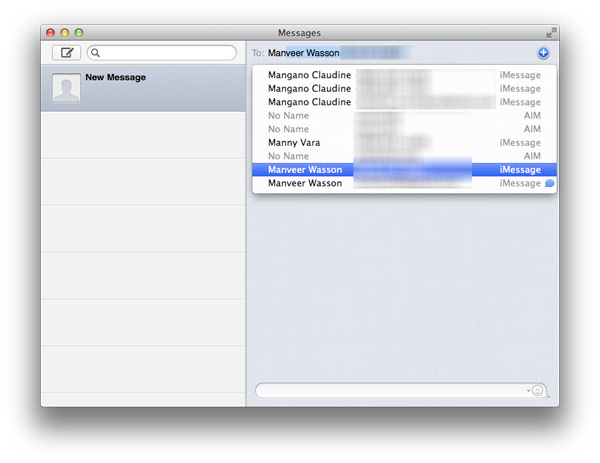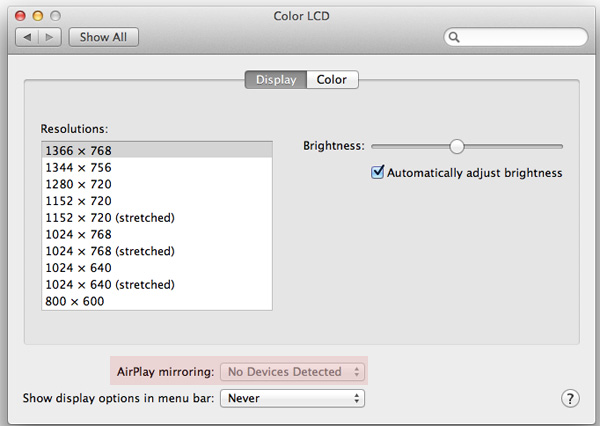Thoughts on the Mac OS X Mountain Lion Developer Preview
by Andrew Cunningham & Anand Lal Shimpi on February 19, 2012 7:40 PM EST- Posted in
- Mountain Lion
- Mac
- macOS
Messages
One of the more tangible features of Mountain Lion is Messages, the iChat replacement that's long overdue. The main attraction is the ability to send messages to iMessage users from your Mac. The feature works and is available to Lion users as well through a beta, however the final version will be a Mountain Lion exclusive.

AirPlay Mirroring & QuickSync
Since Arrandale Intel has been offering its own flavor of wireless display technology called Intel WiDi. The premise is simple - take the display buffer, encode it in real time as a video (originally MPEG-2, later H.264), send it over WiFi to a box that can decode the video stream and display it over HDMI to an attached display (e.g. a HDTV). Apple enabled something similar on its iDevice platforms called AirPlay Mirroring. Deploying AirPlay Mirroring on iDevices made sense since all of those platforms ship with hardware encoders on their SoC. With Mountain Lion Apple is bringing the same functionality to Macs. The only requirements are that you have a second generation Apple TV and that it's on the same network as your Mountain Lion Mac.
AirPlay Mirroring isn't functional currently but by the time ML ships it should be. The usage models are plentiful (presentations, quickly tossing videos on the big screen for many users to watch, etc...) and the feature should do a good job of selling Apple TVs to Mac users.

Apple isn't being very specific on what hardware platforms will support AirPlay Mirroring. Sandy Bridge and later Macs shouldn't have a problem and I hope that Apple will leverage Intel's QuickSync technology to keep CPU utilization low. It's possible for earlier Macs to handle the encode workload but there's obviously a performance tradeoff. Apple is usually very sensitive to maintaining user experience over guaranteeing functionality so it'll be interesting to see where it draws the line for AirPlay Mirroring compatibility.
Unfortunately there's no update on QuickSync support elsewhere in Mountain Lion. Thus far all Finder and Quicktime initiated video transcoding is done in software on the x86 cores and doesn't appear to leverage QuickSync at all. Why Apple generally refuses to use one of Sandy Bridge's most valuable features for consumers remains a mystery to me.
Server
I won't dive too far into Mountain Lion Server, since this is just supposed to be a quick first look at a very early version of the product. However, for users of the product (and/or readers of our huge Lion Server review) there's one important change that comes in with 10.8 - Lion introduced a new program, Server.app, which took over some (but not all) of the functionality provided by the legacy Server Admin Tools. The tools are still provided as a separate download to close the functionality gap left by Server.app.
In Mountain Lion Server, more functionality of the Server Admin Tools appears to have been integrated into Server.app - NetBoot, the System Image Utility, DNS, and a few other services can now be managed in Server.app. There are still a few services that appear to be missing (DHCP, NAT, and a few others appear to be absent) - it's too early to say whether these services will be included in Server.app when Mountain Lion is launched, whether the company will offer a new version of the Server Admin Tools, or whether those services will be removed from OS X Server altogether.
Supported Macs
The last thing I wanted to talk about is something we've already touched on, but it bears repeating - Mountain Lion is dropping support for any Mac that is not capable of booting OS X's 64-bit kernel. Lion requires a 64-bit capable Core 2 Duo processor or better, but included the legacy 32-bit kernel to enable support for computers missing one of the other two components required for a 64-bit boot: a 64-bit EFI, and 64-bit graphics drivers. The complete list of supported Macs is below:
• iMac (mid 2007 or later)
• MacBook (13-inch Aluminum, 2008), (13-inch, Early 2009 or later)
• MacBook Pro (13-inch, Mid-2009 or later), (15-inch, 2.4/2.2 GHz), (17-inch, Late 2007 or later)
• MacBook Air (Late 2008 or later)
• Mac Mini (Early 2009 or later)
• Mac Pro (Early 2008 or later)
• Xserve (Early 2009)
Generally speaking, if you don't want to use this Apple Support document to see whether your Mac supports the 64-bit kernel, there are a few rules of thumb you can use: if your Mac uses either the ATI Radeon X1600, Intel's GMA 950 or X3100, and any NVIDIA GeForce card older than the 8000-series, your Mac is likely disqualified from running Mountain Lion. This list includes computers (like the pre-unibody white MacBooks) sold just a little under four years ago, which is no doubt unwelcome news to users of those systems - unfortunately, you'll either have to upgrade your system or stick with Lion if you've got one of the unsupported Macs.
Some have reported that the Mountain Lion Developer Preview will install and run on some of these unsupported Macs without issues, but if you'll recall, early Lion previews could also be made to run on 32-bit Core Duo and Core Solo processors that were dropped from the support list. If the system requirements for the preview are in fact representative of the requirements for the shipping version of Mountain Lion, expect booting on those older machines to be blocked at some point in future previews.










96 Comments
View All Comments
solipsism - Sunday, February 19, 2012 - link
AT has plenty of articles about Win8.• http://www.anandtech.com/tag/windows-8
Keep in mind that Win8 was leaked, in pieces over a long time so AT had to mostly write blog-length statements about many of the new features as they dropped, while Apple dropped an entire OS update at once with a detailed webpage and reviews by famous journalists and bloggers who got a one-one-one.
ananduser - Monday, February 20, 2012 - link
Anand is a mac user nowadays. Of course he tends to give more attention to mac wares and mac software. That doesn't mean he ignores other platforms or is less fair.solinear - Tuesday, February 21, 2012 - link
Honestly, I couldn't disagree more. There is a huge amount of attention paid to every Apple product here now, almost like it's a "zealot lite" website. I love how they focused on the amazing improvements in the browser, talking about how the tabs worked and scaled now... I'm sorry, but I haven't seen a browser where the tabs didn't scale automatically as you opened more in ages, but Apple is the 'standard' that they compare everything else to?As a result, I tend to find myself going to the hardware (SSD mostly) reviews and ignoring a lot of the others. I might be largely alone, but I see a very heavy amount of coverage to the Apple products, particularly for their market share. If he's going to review Apple stuff all the time, maybe he should be reviewing various Linux distro GUI changes and so forth, if he wants to be fair. I can only remember one of those and it was a LONG time ago.
repoman27 - Wednesday, February 22, 2012 - link
If you're not interested in reading articles about Apple products, simply ignore them. If you want AnandTech to focus more on topics of interest to you, just ask, they seem pretty receptive to input.If Apple articles get a significant number of page views and generate decent revenue for the site, why should AnandTech stop posting them? Just because you're not interested in this type of content doesn't mean that other readers aren't. (Apple now has greater than 10% of US marketshare, and their customer base tends to be of a demographic group that is quite desirable to advertisers.)
KPOM - Monday, February 20, 2012 - link
I doubt it. If anything, iOS 6 would be more of the response to Windows 8 than Mountain Lion. The Mac is an important part of Apple, but it represents only 25% of its revenue. iOS represents about 50% of its revenue and about 70% of its profits.Apple always has had a faster release cycle for OS X than Microsoft had for Windows. Plus, they have for quite a while dropped support for older Macs and/or software with each new release. Leopard dropped the Classic mode. Snow Leopard dropped PowerPC. Lion dropped Rosetta and 32-bit Macs. Apple, unlike Microsoft, makes its money on hardware rather than software, and thus does not have an incentive to keep its new operating systems running on ancient hardware the way Microsoft does.
MonkeyPaw - Sunday, February 19, 2012 - link
"The last thing I wanted to talk about is something we've already touched on, but it bears repeating - Mountain Lion is dropping support for any Mac that is not capable of booting OS X's 32-bit kernel."Am I understanding that right, or should that read "64-bit kernel"?
jedivulcan - Sunday, February 19, 2012 - link
From what I've been reading and seeing elsewhere on the internet, AirPlay Mirroring does using the latest iOS 5 beta for Apple TV and a Sandy Bridge based Mac.solipsism - Sunday, February 19, 2012 - link
I'm not a fan of LaunchPad but it's perfect for those that aren't heavy or proficient computer users. It makes finding and executing an app simple while bringing a familiarity seen on iOS-based iDevices which far outnumber Macs.PS: Dashboard also gets the Launchpad-like displaying of widgets and it's much better than their previous model of having a single row at the bottom that scrolls off screen.
ltcommanderdata - Sunday, February 19, 2012 - link
Any word on new OpenCL (1.2) or OpenGL (4.x) support?With no QuickSync instead relying on CPUs, hopefully they at least are implementing extensive SSE4.x and AVX acceleration.
ananduser - Monday, February 20, 2012 - link
Apple is not really famous for up to date graphical driver support. And in a way I tend to side with them. The most recent OpenGL implementations are only needed for games and not for CAD.